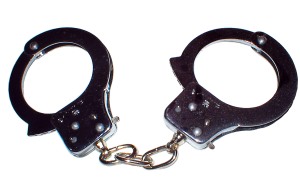 Imagine you are pregnant. Nine months pregnant. And in prison. Imagine that when you go into labor, your escort to the hospital, an armed guard, insists on keeping your hands and/or feet shackled. Consider the implications of restrained foot movement for a top-heavy pregnant woman. Now, when you arrive at the hospital, in order to ensure that you will not escape (even though you are fully pregnant and having contractions), the guard then attaches you to the hospital bed by hand, foot, or belly restraints. Try to imagine how would you feel about that.
Imagine you are pregnant. Nine months pregnant. And in prison. Imagine that when you go into labor, your escort to the hospital, an armed guard, insists on keeping your hands and/or feet shackled. Consider the implications of restrained foot movement for a top-heavy pregnant woman. Now, when you arrive at the hospital, in order to ensure that you will not escape (even though you are fully pregnant and having contractions), the guard then attaches you to the hospital bed by hand, foot, or belly restraints. Try to imagine how would you feel about that.
These restraints limit mobility for the birthing mother, which can normally help ease and facilitate the labor process. And the restraints can cause delays if she needs to be prepared quickly for a caesarean section.
The practice of shackling incarcerated pregnant woman is widely condemned by medical groups including the Association of Women’s Health, Obstetric & Neonatal Nursing. It’s also been condemned by the United Nations in various treaties and documents, some of which the US has signed on to. But despite the condemnation of this kind of shackling, which is often framed as a type of illegal, cruel and unusual punishment, it still occurs.
Less than twenty states have laws against shackling inmates while giving birth. California just passed a law to forbid shackling a woman during “pregnancy, labor, delivery, and recovery,” reports Huffington Post. Even in states without such legislation, incarcerated women (and women who were held and not-yet-convicted) have been filing — and winning — lawsuits for their treatment during labor. A case like this was filed in Nevada this summer, reports Reuters. In September, The Tennessean ran a story about a woman receiving $1.1 million in damages from the metro government for the way she was treated while in custody and in labor.
Shackling during pregnancy is not only viewed as a violation of the Eighth Amendment (re: cruel and unusual punishment), but the UN has condemned the practice in their Bangkok Rules (on the treatment of women prisoners). In 2006, the UN cited the US for not maintaining the international standards that they signed on to when ratifying the UN Convention against Torture and Other Cruel, Inhuman or Degrading Treatment or Punishment.
This topic is new and rich to me, as I’ve been researching it for a term paper. I wanted to share my findings and tie them in with yesterday’s observance of the 2012 Human Rights Day. The theme of the day was “My Voice Counts,” which ties in so well with this anti-shackling group I found while digging around for my project.

WORTH is a New York based group that lobbied for the state bill that prohibited shackling women in labor. The project expanded their reach to reproductive rights of incarcerated women throughout the US. They are currently collecting testimonials from women who have been incarcerated. The project is called Birthing Behind Bars. They have a website to host blog posts, videos, and audio stories about women who gave birth in shackles or had a range of other pregnancy or postpartum experiences in prison. They’ve even asked for stories about the prison nursery experience, for those women incarceration in institutions with nurseries (that is a topic worth its own post).
The broad range of stories sought by WORTH is a testament to the fact that shackled labor is not the only challenge for pregnant women in prison. Other hurdles including getting adequate nutrition and dealing with the emotional strain of separation from the baby. For women with mental illnesses (a disproportionate portion of the prison population) immediate separation from a newborn can be especially traumatic.
I am not advocating for reform, but as a journalist, I value the power of story-telling. And for the women with traumatic experiences as pregnant inmates, they deserve to share their story. Please comment with links if you have narratives to share.

